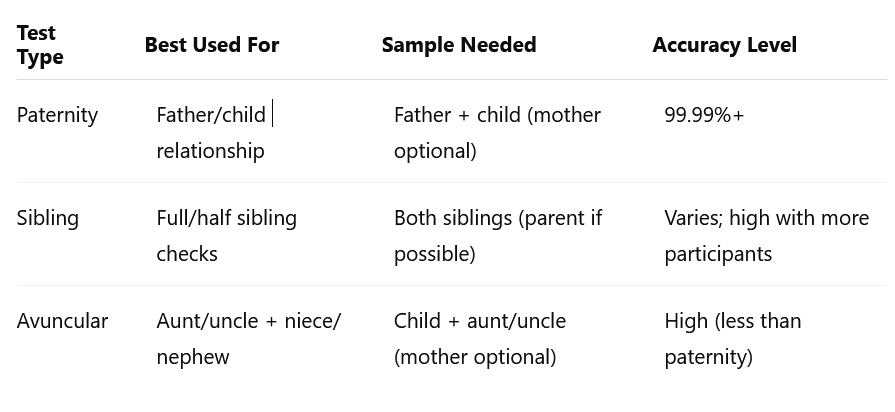Choosing the Right DNA Test
If you need to confirm a family relationship but aren't sure which DNA test is right for your situation, you're not alone. Whether you’re trying to confirm fatherhood, establish a sibling relationship, or test a niece or nephew against an aunt or uncle, different DNA tests are designed for specific types of biological relationships.
In this guide, we’ll walk you through the main differences between paternity, sibling, and avuncular DNA tests, and help you choose the right one based on your needs.
Paternity DNA Testing
Purpose: Confirms whether a man is the biological father of a child.
Best For:
Direct father-child relationships
Legal documentation (e.g., custody, child support, birth certificates)
Peace of mind and family planning
Accuracy: Over 99.99% when a relationship is confirmed; 100% when excluded
Requirements: Oral swabs from alleged father and child; mother’s sample optional but recommended
Sibling DNA Testing
Purpose: Determines if two individuals are full siblings, half-siblings, or not biologically related at all
Best For:
When the alleged parent is unavailable or deceased
Reuniting adopted individuals or family members
Immigration or inheritance scenarios
Accuracy: Varies depending on available participants. More participants (like a known parent) increases result clarity.
Requirements: Oral swabs from both siblings; additional known relatives can improve accuracy.
Avuncular DNA Testing
Purpose: Tests whether a child is biologically related to their aunt or uncle
Best For:
When the alleged father or mother is unavailable
Reconstructing family relationships in legal or inheritance cases
Accuracy: Less direct than paternity testing but still highly reliable with lab-grade STR analysis
Requirements: Oral swab from the child and the aunt or uncle; maternal sample recommended for better results. Do note that the Aunt or Uncle must be a full blooded sibling to the mother or father in question, an Avuncular test will NOT work if the sibling to the mother or father is a half-sibling (related through only one parent).
DNA Test Comparison at a Glance
Quick comparison of Paternity, Avuncular and Sibling DNA Tests
Legal vs. At-Home Testing
All of these tests can be performed for either personal (peace-of-mind) or legal purposes. Legal tests require a formal chain of custody, while at-home kits can be self-administered for private use.
FAQs
Q: Which test is best if the father isn’t available?
A: Sibling or avuncular tests are both good alternatives, depending on who’s available.
Q: Are these tests court-admissible?
A: Yes, but only if you follow a legal chain-of-custody collection process.
Q: How long do results take?
A: Most tests are completed within 2-3 business days after the lab receives the samples.
Final Thoughts
Choosing the right relationship DNA test depends on who is available for testing and how direct of a relationship you're trying to confirm. Validity Genetics offers a full suite of reliable, easy-to-use tests to help you get answers, confidentially and accurately.
Not sure which test to choose? Contact us at Info@ValidityGenetics.com and our professionals can help guide you.





